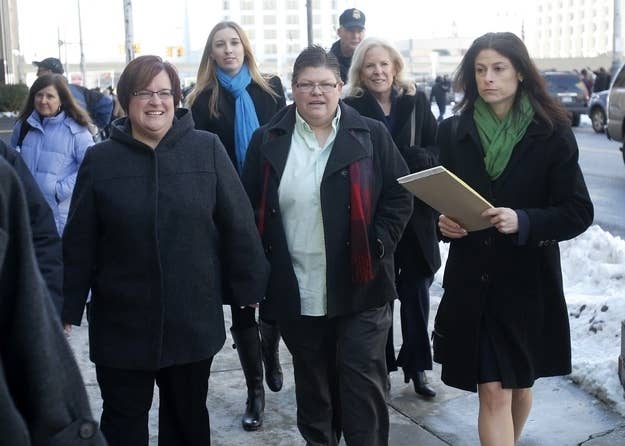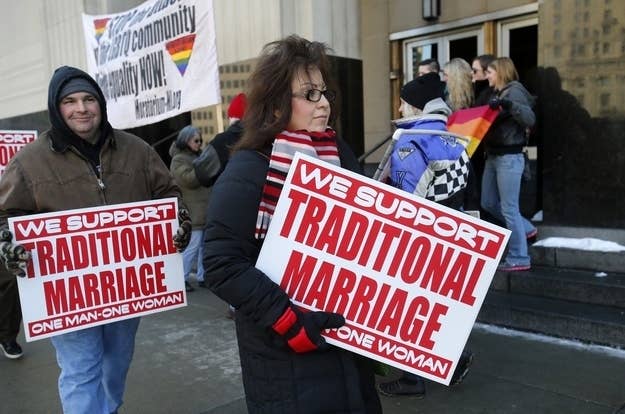
DETROIT – In the courtroom equivalent of dropping the mic, an attorney for a lesbian couple suing for marriage rights in Michigan stood up for his expected five-minute rebuttal after the state's closing arguments by Kristin Heyse, and then thought better of it.
"There's nothing that Ms. Heyse has said that changes the law or the facts or refutes our argument," a confident Ken Mogill told a surprised U.S. District Court Judge Bernard Friedman, referring to the assistant attorney general's summation. "Therefore there's no need for rebuttal."
With that, testimony in only the third courtroom trial over same-sex couples' marriage rights in U.S. history abruptly ended with an understated flourish befitting proceedings that, for all their historic significance, nonetheless flew largely under the national radar when compared to the attention paid to similar cases in Virginia, Utah, and elsewhere.
The two-week trial – which now awaits a written decision from Friedman that he said wouldn't come before March 17 – was the first such event since 2010 when a federal judge considered the constitutionality of California's Proposition 8. The first trial took place in Hawaii in the 1990s, but the result in support of marriage equality was never realized because Hawaii voters passed a constitutional amendment allowing the legislature to ban same-sex couples from marrying.
Prop 8, like the Michigan marriage statute, was a constitutional ban on same-sex marriage imposed by voters. The federal judge struck down the ban, and last June, the Supreme Court let that decision stand in dismissing the attempted appeal by supporters of the amendment.
Activists on both sides of the issue flocked to California for the Prop 8 case, each issuing a flurry of press releases at every turn. Helmed by big-name lawyers Ted Olson and David Boies, it was the subject of lawsuits over whether testimony should be broadcast live or at least on delay and later gave rise to a play written by Oscar-winning screenwriter Dustin Lance Black and performed by an A-list Hollywood cast.
By contrast, the Michigan trial drew just a couple dozen protesters on both sides to a combined picket line outside the courthouse, often in freezing temperatures and brutal winds. The courtroom was rarely full, not even on Tuesday when attorneys for April DeBoer and Jane Rowse cross-examined controversial sociologist Mark Regnerus. Regnerus' findings, which claim children fare worse when raised by same-sex couples than their married biological parents, have been called into question by academics and LGBT advocates but have been cited by opponents of same-sex couples' marriage rights in several cases pending around the country.
Mogill, appearing outside the court following the trial, said he's unbothered by how relatively quietly the proceedings have gone.
"Actually, we had more help from out of state than meets the surface," he said, noting that two staff attorneys from Gay & Lesbian Advocates & Defenders and Leslie Cooper from the ACLU's national office assisted. "I can't imagine how much more tired we'd be if we didn't have their wonderful help along the way."
Regardless of the trial's lower profile, it produced a litany of key moments that may impact the future of ongoing marriage litigation — including what most legal experts see as an inevitable Supreme Court case — depending on how Friedman rules. Should he strike down the ban, for instance, the withering cross-examinations undergone by Regnerus and other experts called by the state this week may be cited in briefs for cases in other states, Mogill said.
Regnerus is a University of Texas at Austin sociology professor whose New Family Structures Study was funded and organized in concert with several prominent anti-gay-rights groups. He asserted that his examination of 248 adults who say one of their parents had a same-sex relationship at some point in their childhoods shows that children with gay or lesbian parents fare worse academically and behaviorally than those from intact heterosexual families.
The study appeared in July 2012 in the journal Social Science Research, which, after a vicious backlash from professional groups, conducted an audit of Regnerus' work and then published a report saying the study should not have been published. On Monday, when Regnerus appeared on the stand as an anti-gay-marriage expert for the state, the chair of his department at UT issued a statement distancing the university from his work and calling the study "fundamentally flawed."
Regnerus, quizzed by Cooper on behalf of DeBoer and Rowe, acknowledged that the adults in his study were born before 1993, in a different era for gay acceptance. He also conceded that almost all of the 248 adults were the product of broken heterosexual homes — a significant risk factor for child welfare — and that the two who were raised from birth to adulthood by stable gay couples turned out "pretty good."

"It is impossible to find a more reviled, discredited social science study in recent decades than the Regnerus study," Mogill said in his closing arguments on Friday. "That is a study designed to produce skewed results."
A key feature of the state's argument was that reserving marriage to opposite-sex couples is the will of Michigan voters and that more study is needed to determine the impact of same-sex parenting on children.
"The fact of the matter is men and women are different and mothers and fathers are not interchargeable and certainly not indispensable," Heyse said in her summation. "The evidence shows that there are benefits to a child being raised by a mom and a dad. Social science is just too uncertain" on the outcome of gay parenting.
Throughout the trial, plaintiff attorneys had established that there are several classes of parents known to turn out more troubled kids — namely the poor, less educated and divorced. None of those groups, Mogill reiterated in his summation, "are barred from marrying nor required to establish parenting competency for the right to marry."
"The tradition that has been most important to marriage has been the tradition of being able to change," he said, noting to the judge that that marriage once conferred to a husband powers over his wife that no longer exist. "The capacity for change has been a core value in the capacity of marriage to survive and thrive."
Rowse and DeBoer, who became plaintiffs in order to become legal co-parents to their three children, emerged from the courthouse to cheers. DeBoer had wept during Mogill's closing, in particular at a moment when he compared the couple to the Lovings, who, in 1967, persuaded the U.S. Supreme Court to strike down bans on interracial marriage.
"Our civil rights are being violated, and their civil rights were being violated as well," DeBoer said of the emotional moment. "Part of me related to their struggle and what they had to do, and now what we have to do in order to get rights for our children in the state of Michigan."
Friedman, appointed to the bench by President Reagan in 1988, told the court he would spend the next week or so reading and considering the testimony. It was unclear whether, should he strike down the ban, he would also issue an immediate stay on the ruling — which would keep marriages for same-sex couples on hold — pending an appeal to the 6th Circuit Court of Appeals. Attorney Michael Pitt, who represented the clerk of Oakland County who wants to start allowing same-sex couples to wed, urged him not to do so. Heyse, in her summation, said that allowing gays to marry before the appeal is settled would create confusion and uncertainty.
Friedman has seemed keenly aware that, because he has presided over the only live trial since Prop 8, whatever he writes will be read by Supreme Court justices. He also is likely to consider that since October when he scheduled this trial, the number of states where same-sex marriage is legal has swelled from 13 to 17. Several other federal judges have ruled for same-sex couples' marriage rights as well, including one in Texas, while the Michigan trial was in session. In each case, judges have interpreted last June's U.S. v. Windsor decision striking down part of the Defense of Marriage Act as unconstitutional as meaning that state laws defining marriage as one man and one woman are likewise unconstitutional.
"Judges are affected by movements in opinion," said Mae Kuykendall, a law professor at Michigan State University. Kuykendall said that, though it remains uncertain which of the cases bubbling up around the nation will end up before the Supreme Court, Michigan easily could figure in whenever that occurs.
Mogill was practical about whether this case would be the one heard at the Supreme Court — while pointing to advantages that the case's posture would bring to the court.
"Having a factual record is significant as appellate courts consider these cases, certainly, and that's something the judge was very cognizant of" when he decided not to issue a summary judgment in October, Mogill said. "We're very happy with the state of the record in this case. We think it supports our position, and what the Supreme Court's going to do, they're going to do, and they're going to do it when they do it. Whichever case gets there first is just absolutely fine."
CORRECTION: This article was corrected to reflect that this is the third such trial in U.S. history and that the name of the Regnerus study is the New Family Structures Study. 3/8/14.
